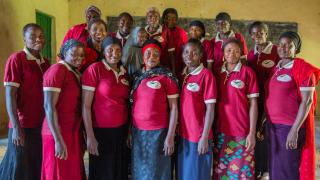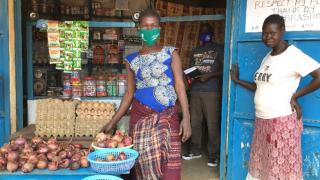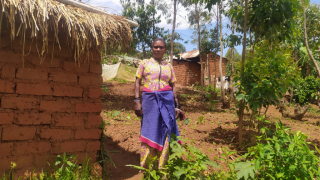On a Roll Towards Empowerment
“Let me tell you what I think of bicycling. I think it has done more to emancipate women than anything else in the world.”
More than 100 years ago, Susan B. Anthony and leaders of the women’s movement in the United States celebrated the bicycle’s role in helping women access new opportunities and expand their horizons.
Today, bicycles still have a powerful impact on the lives of women around the world, especially in the rural communities where we work. For women in rural areas, the most common mode of transportation is walking, but having a bicycle can help them earn more money. With a bicycle, women can travel four times further in the same amount of time and carry five times more goods than they could on foot.
For women entrepreneurs in our Stronger Women, Stronger Nations programme, owning a bicycle has helped them grow their businesses and support their families.
Read how bicycles have changed Mukunde and Alphonsine's lives:
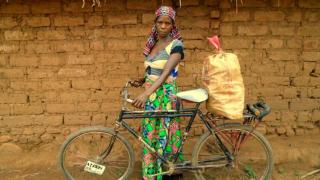
Mukunde
“To have a bicycle is a high step in my life, as it serves in many different ways,” says Mukunde, a 40-year-old woman living in South Kivu in the Democratic Republic of Congo. She smiles as she recalls how she bought her first bicycle, using savings from her soap-making business and the monthly training stipend she received through our Stronger Women, Stronger Nations programme.
Few women in her community can afford bicycles. For Mukunde, owning a bicycle has transformed her ability to earn income to support her four children. "I am able to carry my agricultural products [from the farm to the market] using the bicycle, and so I am not very tired as I used to be in the past,” says Mukunde. She also uses her bicycle as a taxi, carrying both people and products to earn additional money.
Mukunde is also continuing to build her savings to achieve her goals in the next year. “I plan to rebuild my house. My children will complete their education curriculum,” she says. She also hopes to buy more land to help with her vegetable selling business.
I do not wait to beg or receive help from others. I am now self-sufficient… With the income earned by the bicycle, all my children go to school, they are fed, and getting clothes.
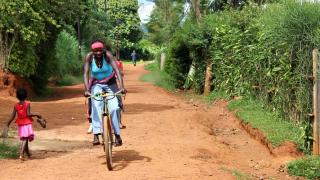
Alphonsine
“I am more confident about the future,” says Alphonsine, a mother of two boys in Kicukiro, Rwanda who has been working to rebuild her life after separating from her husband.
Alphonsine recalls how her husband would take the vegetables that she had worked hard to harvest for their family. “He would leave nothing for us. It was creating conflicts.”
Determined to give her children a better future, Alphonsine left him. “Now my focus is on my kids and our future, which I believe is better than our past.”
A new bicycle is helping drive Alphonsine’s optimism. By saving the monthly stipend she has been receiving during our Stronger Women, Stronger Nations programme, she could invest in a bicycle to help grow her small business selling vegetables and fruits.
Since separating from her husband, Alphonsine and her sons have been living in her parents’ kitchen. Now that her business is growing, she is working on plans to build a new home.
“I am already in the process of registering the small land that I got from my parents. This will help us to live in better conditions. We will leave my parents’ kitchen.”
For now, her income from the bicycle enables her to provide for her family, pay for their health insurance and continue to reinvest in her business.
With their bicycles, both Mukunde and Alphonsine are starting a new journey toward their dream of economic empowerment.
I no longer walk to the markets to sell my vegetables and fruits now that I have a bicycle. Now I am less tired, I can achieve more and sell more. Life is different now.
Find out more
July 3rd is International Cooperatives Day, and we're celebrating the power of women's collective enterprises to transform lives and communities.
Nema
subtitle:
Nema lives with her husband and five children, displaced in South Sudan after fleeing conflict in their hometown in 2016. Read about how our programme helped Nema become an entrepreneur and rebuild her life.
In the Democratic Republic of Congo, restrictive gender norms make it difficult for women to purchase land in their own name. Read Gorette, Furaha and Gentille's stories - three of our programme graduates who have defied the odds and now help other women to do the same.

